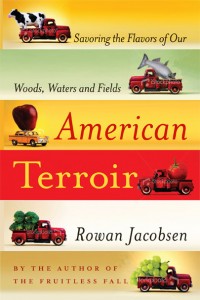“Rowan Jacobsen is one of the best writers reporting on, and thinking about, food today. Period.” –Michael Ruhlman, author of The Soul of a Chef and Ratio

“Insightful and funny… one of those important books everyone will be reading and talking about.” –Melissa Clark, author of the New York Times column “A Good Appetite“
One of the Top Ten Books of the Year. —Library Journal
One of the Top Food Books of 2010. —Booklist and Kirkus
Why does honey from the tupelo-lined banks of the Apalachicola River have a kick of cinnamon unlike any other? Why is king salmon from Alaska’s Yukon River the richest in the world? Why do coffee beans from a single estate in Panama sell at auction for ten times the price of any other beans in the world?
The reason is terroir, the “taste of place.” Originally used by the French to describe the way that local conditions such as soil and climate manifest themselves in the flavor of a wine, the terroir concept has since been extended to discussions of many foods that are dependent on place for their uniqueness. France long ago mapped its terroir into a network of regions that produce distinctive wines, cheeses, meats, and other foods, and other nations in Europe followed suit. America is finally catching up, and terroir is a fast-rising buzzword in the food world.
As Americans read Michael Pollan, watch documentaries like Food, Inc., and learn of the latest salmonella outbreak, they are paying more attention than ever before to the origins of their food. American Terroir will introduce them to the “flavor landscapes” of some of our most iconic foods, including apples and cider, honey, maple syrup, oysters, salmon, wild mushrooms, wine, cheese, coffee, and chocolate—and explain why all foods are not created equal. Ultimately, good eating is about romance, and American Terroir finds that romance in the farms, forests, and waters where our great foods live.
“One cannot help but get a little hungry while perusing Jacobsen’s enchanting book. Part manifesto, part travelogue, part science lesson, and part cookbook, this saliva-inducing work is perhaps best described as erotica—a sensual, titillating, sometimes lewd journey into the best foodstuffs of America. . . . a vitalist—one might even say pantheist—sensibility courses through these pages.” –Jerome Copulsky, The New Republic
“American Terroir removes the mystery yet holds onto the romance about superlative ingredients and their source of great flavor. Jacobsen gives us the history, the science, the grist, but also the magic in an easy and natural voice. This is a great read that will leave you not only wiser but also with a hankering to go out and find a Campbell apple, a Jasper Hill Winnimere and a Spud Island Mussel. Dinner will never be same.” –Peter Hoffman, Chef/Owner of Savoy and Back Forty
“Makes me feel about food writing the way Jimmy Page makes me feel about playing guitar.” –James Wright, Seafood Business
“In a dozen informative and often funny essays spanning breakfast to dinner, Jacobsen deploys an open mind as he travels…beyond issues of slow food and sustainability, Jacobsen’s affable, nerdy DIY spirit (he brewed his own mead for his wedding) challenges readers to rethink their relationship to food.” –Publisher’s Weekly
“A locavore and James Beard Award–winning food writer adapts the French wine-growing concept of terroir, “the taste of place,” to champion a variety of foods from the Western hemisphere…His exuberance, joy in his pursuit and playful diction combine to spice the literary dish most appealingly…Savory information presented on a stylish plate.” —Kirkus Reviews
“Jacobsen documents some of North America’s best growing places and producers. He describes apiculture and honeys in Florida and Arizona. He discovers the best avocados in Mexico’s Michoacán. He finds superior cheeses and maple syrup in Vermont. Northeast Canada yields both mussels and mushrooms. And Jacobsen sources the world’s most esteemed coffee beans from the mountains of Panama. In his travels to these far-flung farms, Jacobsen shows that it is as much farmers’ dedication to their profession that counts as the soil itself.” —Booklist